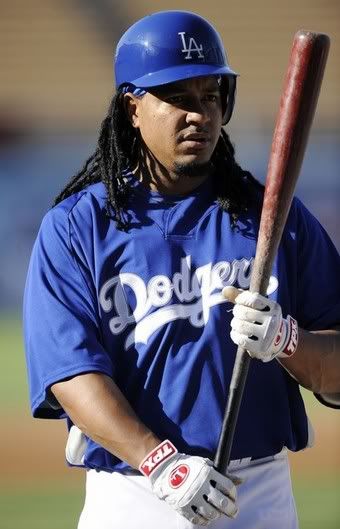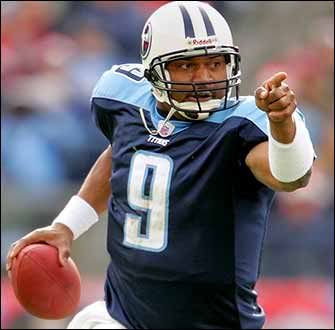 You live in a moral grey zone. You don't exit it when you are in sports fan mode.
You live in a moral grey zone. You don't exit it when you are in sports fan mode.That is the ketchup answer — covers everything — for whatever has been said in the past week about Manny Ramírez and the late Steve McNair. Some sportswriters based in the cities where Manny has hung his do-rag, Boston and Los Angeles, were apoplectic that Ramírez got a hero's welcome when he returned from a 50-game suspension for a positive drug test. Less than 24 hours after Ramírez rejoined the L.A. Dodgers, McNair, who played QB in the NFL for 13 years, was found dead next to the body of his 20-year-old girlfriend. As you know, McNair was still married to the mother of his four children (and God forbid that U.S. lawmakers realize
The common thread is how to deal when sports get crowded by stupid reality again. Once and for all, it is time to divest oneself of the notion that sports fans, much less sports writers get to play the ethics and morality squad. We don't.
Honestly, distancing oneself from the scribbling practised by the likes of the L.A. Times' Bill Plaschke and Boston Globe's Dan Shaughnessy, is about the best thing a sports nut can do. It's not clear if they really hate Manny Ramírez, or if it's just a routine, a face-dance. Either way, very little of it is needed.
Life is too short for both hate and for pundits who substitute shtick for trying to honestly convey what an event was like. When did manufactured outrage replace telling the shades-of-grey truth? As a L.A. Times user, reading Plaschke rail about, "Manny did the time, but what about the crime?" is a little like a pivotal scene near the end of The Shawshank Redemption. You know it. Red (the Morgan Freeman character) tells off a parole board official over the meaning of the word "rehabilitated."
"I know what you think it means sonny. To me it's just a made up word. A politician's word so that young fellas like yourself can wear a suit and a tie and have a job."That is really part of what we're talking about. It's not whether Ramírez's return proves standards have gone all to hell. It's about respecting that ultimately, everyone gets to assert their own terms, not adhere to society's, like Red/Morgan Freeman did with his redemption. This is about getting rid of a sportswriting construct where the columnist fulminates over What Should Be, which has made Bill Plaschke semi-rich.
The hero's welcome Manny got in places such as Albuquerque while playing a few tune-up games in the minor leagues was not reason to go off half-cocked. Americans have always loved outlaws, from Wild Bill Hickok to Barry Switzer. This was not going to change on the say-so of some sportswriters who wanted Manny to do their jobs for them by being all teary and apologetic.
Honestly, Dan Shaughnessy comes off less like a gatekeeper (an outmoded old-media concept) and more like an out-of-touch grouch.
"The longer this goes on, the more it seems that the only people who care about steroids are Hall of Fame voters, a handful of baseball purists, and perhaps those players who have not cheated and now feel like suckers.Far be it to say there was another way to take Selig's comment that "fans everywhere will have to make their own value judgment." No one who was not privy to the conversation know that the MLB commissioner was really "disgusted."
"I called the commissioner to ask him about Manny getting the Charles Lindbergh treatment in San Diego (site of his first game back with the Dodgers).
" 'The only comment I have on that score is that fans everywhere will have to make their own value judgment,' said a disgusted Bud Selig. 'That certainly is out of our control. That’s all I'll say on that.' "
Perhaps Selig, in the parlance of our time, actually dared to address baseball fans as if they are adults. Maybe those aggrieved Hall of Fame voters, rather than act above the rabble who pay for tickets and the MLB Extra Innings package, ought to heed the people who support the whole pro sports apparatus with their discretionary income. Just because you memorized baseball stats as a kid and that influenced your choice of profession doesn't mean you have superior reasoning skills.
Thankfully, there are a few who can better channel their rage and get a post up about this much sooner, such as ShysterBall. ("What all of these columns seem to boil down to is anger at the fact that there has been no sturm und drang associated with Manny's suspension. The minute baseball actually discovers and penalizes a major star in a drama-free and orderly fashion, however, everyone gets bent out of shape.") There is also Charles Pierce, who wrote a wicked piece for Slate on Monday pointing out that if anything, Ramírez betrays the general attitude toward steroids, exposes the big lie.
"... it was of a piece with Manny's greatest gift as a professional athlete — his innate ability to make everything about baseball that is self-reverentially loathsome look ridiculous. In the great, hushed temple that baseball is perennially building for itself in its own mind, it's Manny's who provides the dribble glasses, the whoopee cushions, and the exploding cigars. It is his holy mission to take the living piss out of the self-important, the moralistic, and the people who cling to baseball in order to defend their inherent right to be 13 years old for the rest of their lives. So, there he was, an Albuquerque Isotope, selling out the ballpark and, by all accounts, happy as a clam.No one says you have to like what has gone on in baseball any more than you have to like hearing that McNair was found dead next to a Woman Not His Wife.
"... the great steroid hunt is almost solely an intramural problem between baseball and its various acolytes. The overwhelming number of baseball fans — who, given the economic problems of the moment, are filling ballparks in reasonably overwhelming numbers — have quite obviously made peace with what happened in the game over the past 20 years. Manny Ramirez was treated as though he'd pulled a hamstring or tweaked a tendon. Now, he's back. That's the way things are going to be from now on."
 This is not an apologia for anyone. There is no hair-splitting about the nature of Ramírez's cheating. Steroid experts say the fertility drug he tested positive for is one that "every steroid dealer carries." It is in the same vein with McNair. Not to speak ill of the dead, but there is little to no defending someone straying outside her/his marriage.
This is not an apologia for anyone. There is no hair-splitting about the nature of Ramírez's cheating. Steroid experts say the fertility drug he tested positive for is one that "every steroid dealer carries." It is in the same vein with McNair. Not to speak ill of the dead, but there is little to no defending someone straying outside her/his marriage.The question is why, as a sports lover, one would assume the best about a NFL player, whom you only know through TV images on Sunday afternoons and the odd Monday night, along with some touchy-feely PSAs for the United Way. It might be best to presume everyone, whatever their many virtues while in the moment doing their thing, is flawed like everyone else. One of the most perceptive comments in that vein came from the Chicago Bears defensive end, Adewale Ogunleye:
"Life is not a game. Football is a game. You can't expect a guy to make pinpoint decisions the way he would as a quarterback. I'm not condoning anything but at the end of the day, he's a human being."You know this already, but there are other, better options to have as heroes. Point being, people need to let up a little on the knee-jerk judgments. Meantime, and everyone does this in sports (present company included), it's important not to conflate ability with character.
You cannot keep real life from seeping into sports. If anything, sports seeps into real life. The desperate traditional media might be getting high-school catty, but you don't have to play ball. You just have to accept, hey, in this age you have to stickhandle through a lot of weirdness and shamelessness, kind of like the protagonist in Douglas Coupland's JPod.
I am not advocating for everyone to have lower personal standards for her/his conduct. If anything, it's as important as ever to try to set a good example. But if you're going to have people on that we should expect unambiguous virtue from sports figures, you're dead wrong.
Thank you, Manny Ramírez, and thank you, Morgan Freeman.






